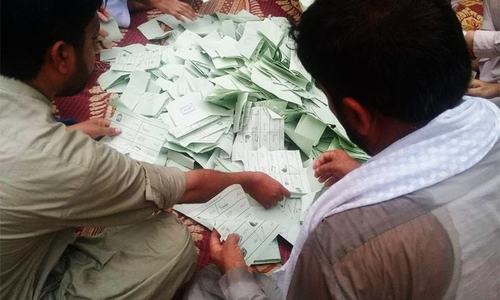ISLAMABAD: The fiasco that affected the conduct of July 25 general elections due to the collapse of the Result Transmission System (RTS) echoed in the Supreme Court on Thursday when the Election Commission of Pakistan (ECP) was ordered by the apex court to remove deficiencies and bottlenecks from the software.
The use of electronic system in the conduct of elections cannot be discouraged, but a reliable alternative system should be in place to be switched to instantly in case of failure of any system, said a three-judge bench headed by Chief Justice Mian Saqib Nisar on Thursday.
See: What happened to the Result Transmission System on election night?
The court also ordered the ECP to consider testing specially designed software during the by-elections to be held on the seats vacated by winners of multiple constituencies for the grant of right of vote to 7.9 million overseas Pakistanis.
SC wants voting rights extended to 7.9 million overseas Pakistanis in upcoming by-polls
When the court inquired from ECP secretary Babar Yaqoob Fateh Mohammad about the failure of the RTS, he explained that the system did not crash during the transmission of the election results though it could be said that it slowed down.
The system, which was developed by the National Database and Registration Authority (Nadra) after it signed an agreement with the ECP for Rs180 million, worked well and the results from different constituencies continued pouring in until 11:30pm, the secretary said, adding that around 82,000 people had been imparted training on how to operate it.
He explained that the judiciary also provided support by deputing their officers to act as returning officers. The July 25 general election was the fifth biggest or massive exercise in the world, he added.
The apex court had taken up a set of petitions moved by PTI chairman Imran Khan and a group of citizens on behalf of Solicitor Mohammad Dawood Ghaznavi, Farhat Javed and others in which the applicants had taken the plea that the denial of right to participate in the democratic process by the overseas Pakistanis would mean a refusal by the government to carry out its constitutional obligation.
On Thursday, the apex court asked the ECP to submit a report highlighting the possibility of testing the software during the by-elections.
The court also emphasised the need for maintaining complete secrecy of the e-voting and like postal ballots should be counted at the end of the counting the votes.
The court made it clear that it was a command of the apex court to grant the facility of vote to the overseas Pakistanis because it was also their constitutional right. Therefore, it was the duty of the commission to implement the same.
When the court expressed its reservation over the practice of contesting elections from more than one constituency, the ECP secretary recalled how the commission had floated a suggestion to ban contesting elections from more than two constituencies and to recover all the election expenses from the candidate for vacating the seat, but parliament did not approve it.
The court, however, observed that parliament was supreme, but the expense for contesting elections on multiple constituencies should be recovered from candidates.
The secretary explained that by-elections were expected to be held from Oct 15 to 20 during which a few constituencies would be selected to experiment and test the newly designed software for e-voting also. But the court ordered the commission to choose at least 50 constituencies during the by-elections in which no technical issues should arise.
The same bench expressed dismay over the delay in filing a reference against the allegations of corruption in the construction of 525MW combined cycle power plant at Nandipur (Gujranwala) and ordered the National Accountability Bureau to provide a list of inquiries that remained dormant during the period when Qamaruzzaman Chaudhry was NAB chairman.
The bench summoned Mr Chaudhry to appear before it and explain his position when it came to its notice that no reference could be filed during his period.
Why an inquiry should not be initiated against the former NAB chairman for sitting on the reference for so many years, the court inquired.
Mr Chaudhry, however, explained that he was the one who ordered the inquiry against the Nandipur project.
The court had taken up a 2011 petition of former defence minister Khawaja Asif pertaining to corruption in the project.
Justice Ijaz-ul-Ahsan regretted that it took NAB six long years to complete its inquiry in the Nandipur project.
The chief justice also said that the 2013 one-man commission report of former Justice Rehmat Hussain Jafri on the Nandipur project was enough to finalize the reference.
The court ordered NAB to seek approval from the next meeting of the executive board for finalisation of the reference in the Nandipur project.
Published in Dawn, August 10th, 2018














































